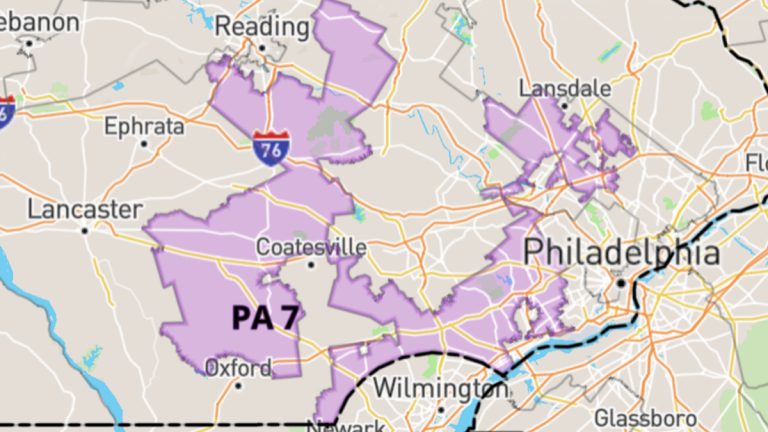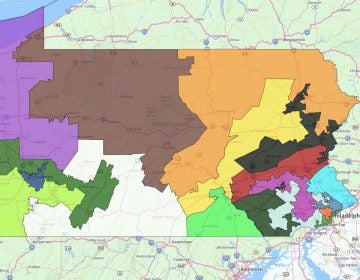U.S. Supreme Court allows lawsuit challenging Pennsylvania’s congressional map to proceed
A federal lawsuit challenging Pennsylvania's congressional districts will move forward after a decision by U.S. Supreme Court Justice Samuel Alito.

Pennsylvania's oddly-shaped 7th Congressional district is often cited as an extreme example of gerrymandering. (govtrack.us)
A federal lawsuit challenging Pennsylvania’s congressional districts will move forward after U.S. Supreme Court Justice Samuel Alito denied, on Friday, a push by the leaders of the Pennsylvania General Assembly to put the case on hold.
The lawsuit, brought by five Pennsylvania voters, claims the state violated the U.S. Constitution by illegally gerrymandering the state’s congressional districts after the 2010 census — when Republicans controlled the state House, Senate and governor’s office.
Since that map was put into place, Republicans have held 13 of 18 congressional seats in Pennsylvania, even though registered Democrats outnumber registered Republicans by 800,000 voters.
Plaintiffs hope for a court order to abandon the current map before the 2018 congressional elections and have it replaced with a fair and nonpartisan map.
Their case hinges on the Elections Clause of the U.S. Constitution, which they interpret as saying that a state legislature cannot come between voters and their national government.
Alice Ballard, attorney for the plaintiffs, argues that this strategy sets their case apart from other legal challenges of partisan gerrymandering currently before the U.S. Supreme Court, as well as the one being considered by the Pennsylvania Supreme Court.
Ballard believes there should be zero tolerance for intentional partisan gerrymandering.
“If you want to end all partisan gerrymandering, Republicans or Democrats, then you want us to win. If you want the Republicans and Democrats to continue gerrymandering, but not just in the extreme, you want us to lose,” said Ballard. “We are the only case that wants to do away with gerrymandering, entirely.”
The federal lawsuit faces its next legal hurdle on Tuesday when lawyers representing House Speaker Mike Turzai (R-Allegheny) and Senate President Pro Tempore Joe Scarnati (R-Jefferson) will argue a motion to dismiss the case under grounds that the issue is non-justiciable.
A case out of Wisconsin that could overturn this ruling, Gill v Whitford, is currently being considered before the high court, with a decision expected by next summer.
That suit aside, Ballard believes their case offers a unique take on the issue.
“We’re looking at a different constitutional theory and we think the courts and the nation are ready for it,” she said.
Attorneys representing Turzai and Scarnati did not return a request for comment.
A three-judge panel will also hear motions to intervene in the case from Democratic voters and hear oral arguments regarding discovery.
The trial is scheduled to begin December 4.
WHYY is your source for fact-based, in-depth journalism and information. As a nonprofit organization, we rely on financial support from readers like you. Please give today.





